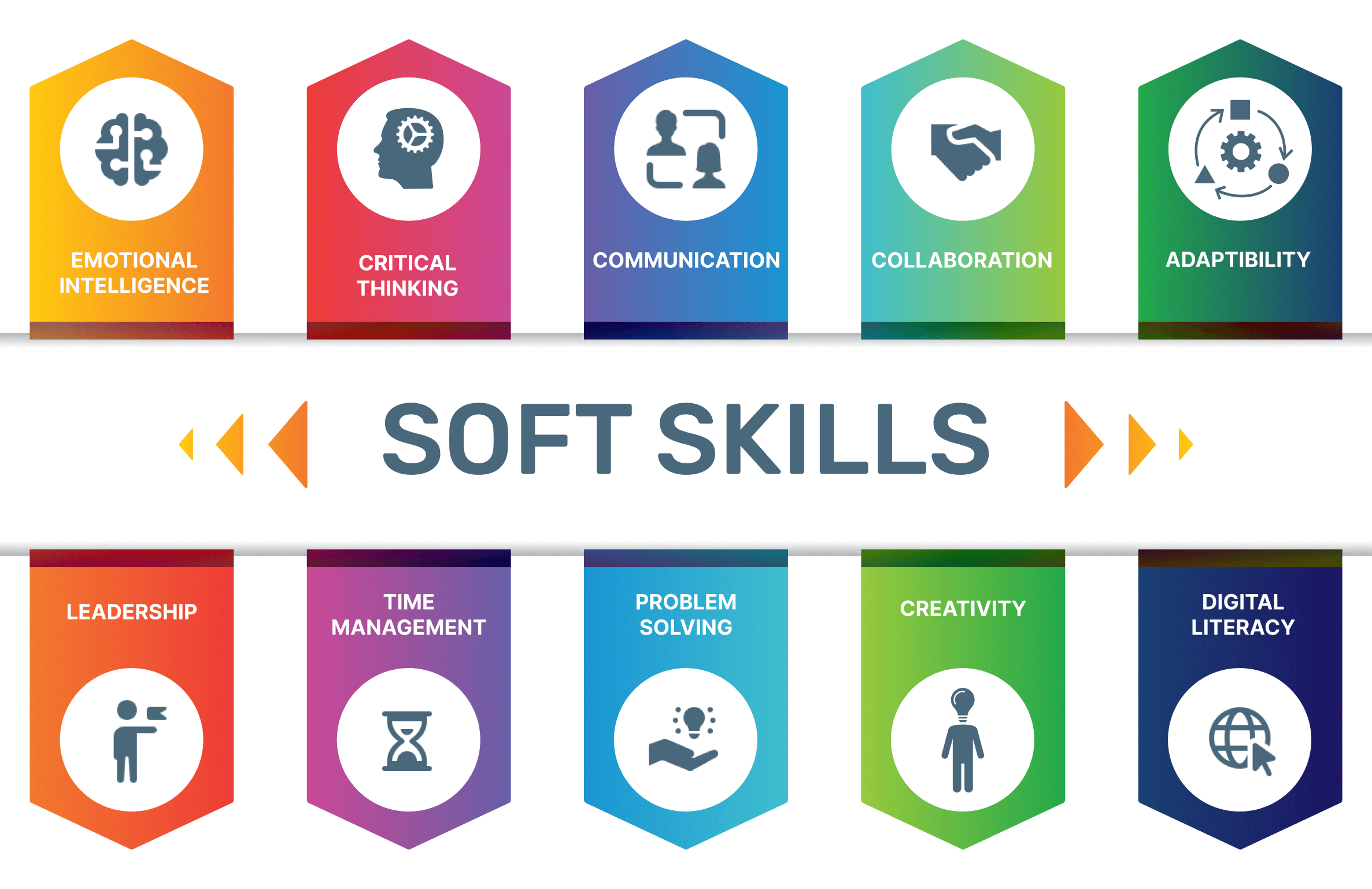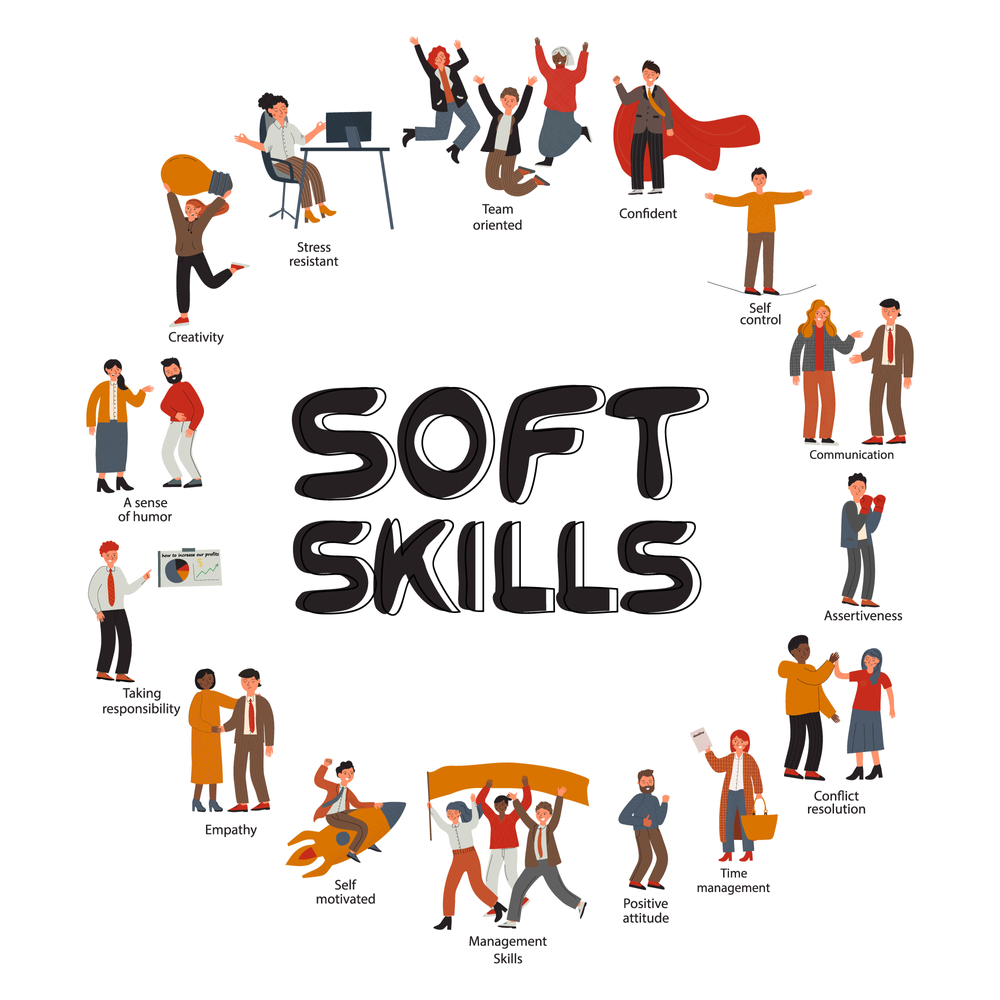10 Essential Soft Skills In 2023 and How to Develop Them

Soft skills are personal qualities for positive interactions in social situations. They differ from technical skills, which are job-specific and acquired through formal education.
Why are soft skills important?
Soft skills are vital for communication, relationships, adaptability, leadership, and teamwork. Moreover, they enable problem-solving, sound decision-making, exceptional customer service, and career advancement. Soft skills contribute to personal growth, self-improvement, and navigating situations confidently. On the other hand, in a competitive world, soft skills provide an edge and are valued by employers. Thus, these skills are vital for success in personal and professional aspects of life.
Are you eager to excel in interactions with colleagues, clients, and stakeholders? Want to boost your career prospects with top-notch communication abilities?
Equip yourself with essential tools to communicate effectively with colleagues, clients, and stakeholders. Gain confidence in writing, presenting, and engaging in productive conversations. So, don’t wait any longer.
Level 2 Certificate in Workplace Communication Skills
This comprehensive course describes the importance of strong business communication skills for career development.
Enrol Now
10 Essential Soft Skills In 2023 and How to Develop Them
In 2023, numerous soft skills remain crucial across diverse professional settings. However, here are ten of them, along with suggestions on how to develop and improve them:
Emotional Intelligence
The ability to recognise and control emotions in oneself and others is referred to as emotional intelligence. It involves empathy, self-awareness, self-regulation, and effective interpersonal relationships.
How to Develop
- Increase self-awareness by reflecting on your emotions, triggers, and values.
- Practice empathy by actively listening, considering others’ perspectives, and showing understanding.
- Develop emotional regulation techniques like deep breathing to manage stress and emotions.
- Build strong relationships by actively communicating, resolving conflicts, and showing appreciation for others.
Critical Thinking
Critical thinking involves analysing information, evaluating arguments, and making logical and informed decisions. It includes problem-solving, reasoning, and the ability to think independently.
How to Develop
- Practice analysing and evaluating information from different perspectives.
- Engage in puzzles, brain teasers, and games that stimulate critical thinking.
- Seek out opportunities to solve complex problems and make decisions.
- Reflect on your thinking process and identify biases or assumptions hindering objective analysis.
Communication
Communication skills involve conveying ideas, information, and messages verbally and in writing. It includes active listening, clarity, empathy, and adaptability in different communication channels.
How to Develop
- Listen attentively, ask questions, and summarise to practice active listening effectively.
- Improve your writing skills through regular practice, reading, and seeking feedback from others.
- Enhance your non-verbal communication by being aware of body language and facial expressions.
- Seek opportunities to present and speak publicly, such as volunteering for presentations.
Collaboration
Collaboration and teamwork refer to working effectively with others towards a common goal. It involves active participation, mutual respect, communication, and compromise.
How to Develop
- Join group projects or initiatives where you can collaborate with others.
- Develop good interpersonal skills, such as conflict resolution, empathy, and diplomacy.
- Practice active engagement by sharing ideas, listening to others, and providing constructive feedback.
- Develop your leadership skills by taking on roles that require coordinating and motivating a team.
Adaptability
Adaptability refers to the ability to adjust to changing circumstances, environments, and expectations. It involves being open-minded, embracing change, and being willing to learn and grow.
How to Develop:
- Embrace new challenges and opportunities that push you out of your comfort zone.
- Stay updated with industry trends and technological advancements.
- Cultivate a growth mindset by seeing failures as learning opportunities.
- Seek feedback and be willing to make adjustments based on the changing needs of a situation.
Leadership
Leadership involves influencing and guiding others toward achieving a common objective. It includes effective communication, delegation, decision-making, and motivating team members.
How to Develop
- Seek leadership opportunities, such as leading a team or taking charge of projects.
- Study leadership theories and best practices to gain a deeper understanding.
- Develop your communication and interpersonal skills to inspire and motivate others.
- Seek feedback from mentors or experienced leaders to identify areas of improvement.
Time Management
Time management refers to the ability to prioritize tasks, set goals, and allocate time effectively to maximise productivity. It involves planning, organisation, and self-discipline.
How to Develop
- Set clear goals and break them down into manageable tasks.
- Prioritise tasks based on urgency and importance.
- Use productivity tools or apps to track and manage your time effectively.
- To maximise productivity, avoid multitasking and focus on one activity at a time.
Problem-solving
Problem-solving refers to the ability to identify, analyse, and find solutions to complex issues. It involves critical thinking, creativity, and logical reasoning to overcome obstacles.
How to Develop
- Take time to fully comprehend the problem before jumping into solutions.
- Divide the problem into smaller, more manageable parts to address each one individually.
- Research and collect relevant data to gain insights and make informed decisions.
- Generate multiple ideas and approaches to tackle the problem from different angles.
- Take action based on the chosen solution and monitor its progress.
- After implementing the solution, reflect on the outcomes and identify areas for improvement.
Creativity
Creativity and innovation involve generating new ideas, approaches, and solutions. It includes thinking outside the box and being open to different perspectives.
How to Develop
- Engage in activities that stimulate creativity, such as drawing, writing, or brainstorming sessions.
- Seek inspiration from different sources, such as books, art, nature, or diverse cultures.
- Embrace a growth mindset that encourages taking risks and learning from failures.
- Collaborate with others and encourage diverse perspectives to foster innovative thinking.
Digital Literacy
The ability to acquire, assess, produce, and convey information using digital technology effectively and responsibly is referred to as digital literacy. It encompasses digital communication, information literacy, online safety, and technological proficiency.
How to Develop
- Explore various digital tools and platforms to understand their functionalities and purposes.
- Develop effective communication skills in digital environments, including proper etiquette and netiquette.
- Keep up with technological advancements by regularly learning and adapting to new tools and trends.
- Create content using digital technologies, such as writing blogs or designing graphics.
- Use resources such as online tutorials, courses, and communities to enhance your digital literacy skills. Developing soft skills is a continuous process; it needs practice, self-reflection, and improvement. On the other hand, seek feedback from colleagues for insights. Also, attend workshops or online courses targeting soft skills development. Consistently practice these skills in various settings to enhance your repertoire.
What soft skills are employers looking for?

Employers typically seek a range of soft skills when evaluating potential candidates. In-demand soft skills vary by industry and job function, here are some examples.
Communication
Strong written and verbal communication skills are highly regarded. Employers look for candidates who can express ideas, listen, and communicate with audiences.
Leadership
Leadership skills are sought after, even for non-managerial roles. Employers admire those who show initiative, inspire, motivate, and lead teams to success.
Teamwork and Collaboration
The ability to work well in a team is crucial. Furthermore, employers want candidates who can collaborate effectively within a group. Hence, cooperation and active listening skills are important qualities employers look for. Moreover, candidates who can compromise and contribute effectively are highly valued by employers.
Problem-solving
The ability to think critically, reason analytically, and solve problems is highly valued. Moreover, employers seek individuals who can identify, analyse, and decide on complex problems.
Adaptability
Employers highly prioritise candidates who can adapt to evolving situations, technologies, and challenges. Likewise, being flexible, open-minded, and willing to learn and grow is highly advantageous.
Emotional Intelligence
Employers value emotional intelligence, including self-awareness, empathy, and relationship management, in candidates.
FAQ:
What are the benefits of having soft skills?
The benefits of having soft skills are:
- Effective communication
- Improved teamwork and collaboration
- Leadership potential
- Customer satisfaction
- Adaptability and resilience
How can I increase my soft skills?
You can showcase soft skills to employers by
- Highlighting them in your resume and cover letter
- Providing specific examples during interviews
- Using references and recommendations
- Updating your online presence (LinkedIn)
How can I increase my soft skills?
You can increase soft skills by
- Reflecting on your strengths and areas for improvement
- Seeking feedback from others
- Attending training and workshops
- Practising empathy and active listening
- Engaging in volunteering or extracurricular activities
















